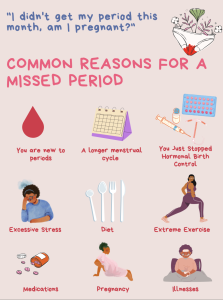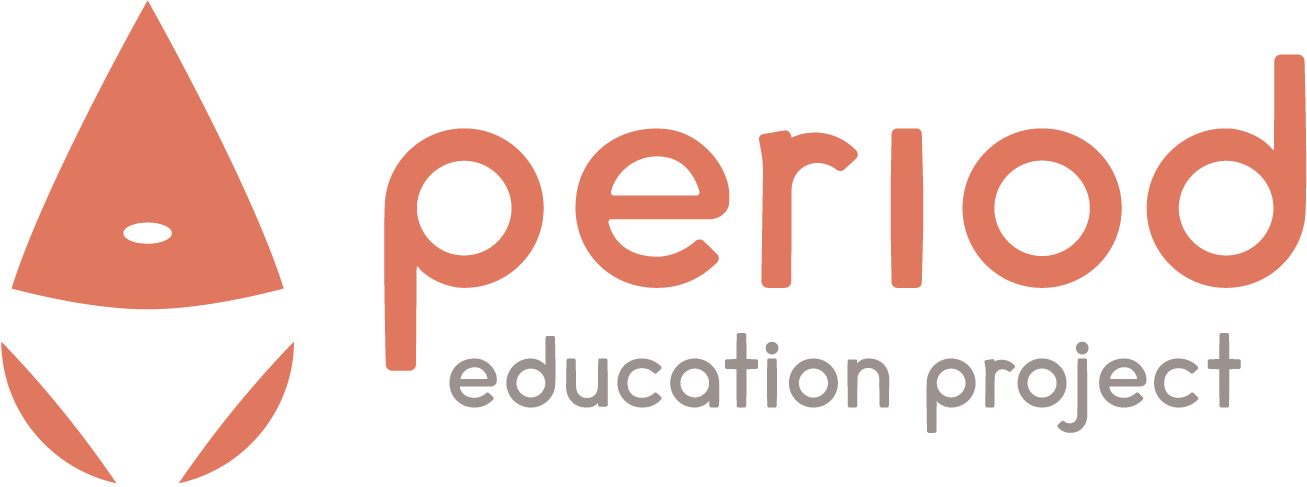By Onyee Ibekwe, Period Pro from The University Of Louisville School of Medicine

Onyee Ibekwe, Period Pro
“I didn’t get my period this month. Am I pregnant?”

Could it be a pregnancy? Yes.
Could it be something else? Yes
I have been in this situation before. A couple of years ago, I was having a conversation with my friend, when I paused mid-sentence. At that moment, I realized I had gone a whole month without my period. I panicked for a second because I had always been on a 28 day regular cycle. My mind automatically went to the worst case scenarios–I was dying or seriously ill. Obviously, I wasn’t dying because here I am years later helping you answer questions about what it could mean to have a late or missed period.
Your Cycle Length 
For the first few years of menstruation, it’s typical to have cycles that range from 21-45 days. That means some cycles may be longer than a month, but your periods are still normal!
For example, if you have a 35 day cycle, you could start your period on Feb 26 and not have another period till April 2nd. This is normal even though you did not have a period in the month of March.
You Just Started Menstruating
Someone who recently started menstruating might not yet have a regular cycle. It can take a few cycles before you begin to have more regular periods. So in the beginning, you might not have a period within a month.
You just stopped hormonal birth control
Hormonal birth control includes some IUDs, the implant, a shot or oral contraceptives. If you have been on this for a while, stopping it might mean that it takes up to a few months before your body returns to having regular menstrual cycles. If you stop a hormonal method, and are not trying to get pregnant, it’s important to use barrier protection. If you have waited a couple of cycles and have still not had a period, it’s a good idea to contact a physician and have a conversation.
Stress
Have you felt like you are juggling a billion things all at once? Or like your head is on fire and you barely have enough time to stop and breathe? If this resonates with you and you have not received your period this month, this might be one of those reasons. During periods of stress, your body produces a hormone called cortisol. Cortisol in moderate amounts is good for your body. During prolonged periods of high stress, excess cortisol production can affect your reproductive hormones and prevent you from having a regular cycle.
Diet
Your body functions well when you feed it well. If you don’t eat, you might get sluggish, irritable, and exhausted. Diet is also an important part of the menstrual cycle. The body needs an adequate amount of calories and nutrients in order to produce the hormones that are necessary for your menstrual cycle. If you don’t get enough nutrition, it can stop your menstrual cycle and cause other harmful changes in your brain and body.
Exercise
Exercise is great for you. However, just like with stress, too much exercise without adequate nutrition or rest can have a negative impact on your reproductive health.
Daily recommended exercise of 60 minutes per day is wonderful for your wellness – including your reproductive health. However, if you plan on exercising intensely (3-4hrs of intense exercise a day) then it is important to consult with a licensed dietician to make sure you are getting enough nutrition to support your body with proper vitamin consumption, fluid intake, carbs, and fat intake.
Pregnancy
Of course, this is always a consideration until ruled out. It might also be your automatic first assumption if you are sexually active. Home pregnancy tests can help rule this out, however remember some pregnancy tests will not detect your pregnancy till 10 days after conception. As always, if you are unsure about any reproductive health issues, reach out to your physician.
As you read this list, you might identify with a lot of these and that can also be normal. I didn’t get my period that month due to several reasons: I was exercising too much (training for a half marathon), not eating adequately, and was under a lot of stress. Once I identified the problems, I changed my diet and found healthy ways to relieve my stress.
Another question you might have is: when should I contact my physician? You should contact your physician whenever you notice any changes to your body or menstrual cycle that might be concerning to you, or out of the ordinary. They are there to educate you about your body and answer any questions you might have.
To summarize, the list above is not exhaustive and there can be several other reasons why you missed a period this month. Certain medications or even illnesses (thyroid problems, Polycystic ovary syndrome (PCOS), diabetes, congenital illnesses, etc) can have an impact on your reproductive health, too.
If you are sexually active and missed your period, take a pregnancy test because you might be pregnant. If you are not pregnant or not sexually active, the list above could explain why you missed a period. Regardless, if there is a new change to your body that is not normal for you, speak with your doctor to advise you on the most appropriate next step.

Recent Comments